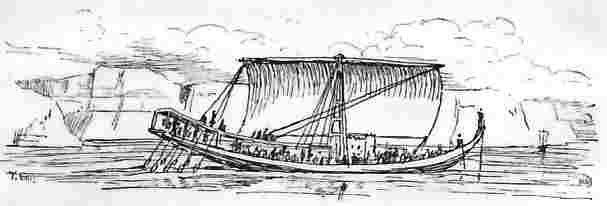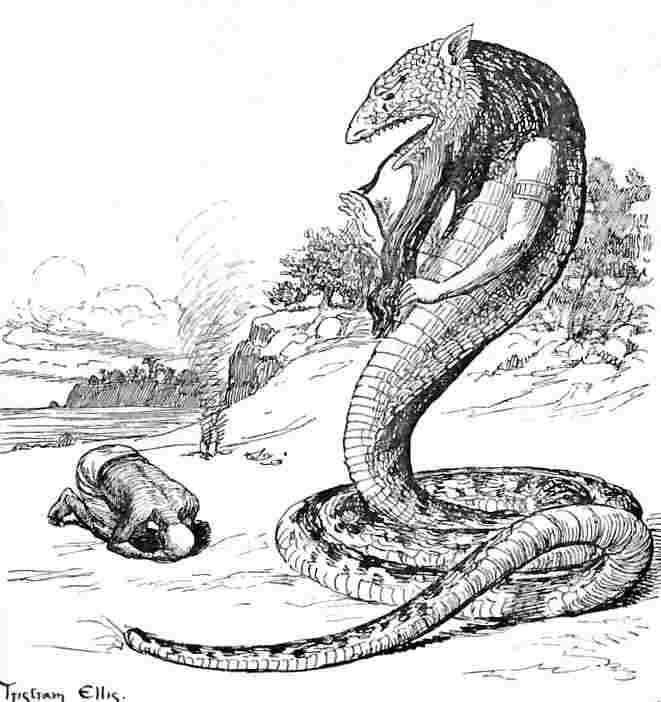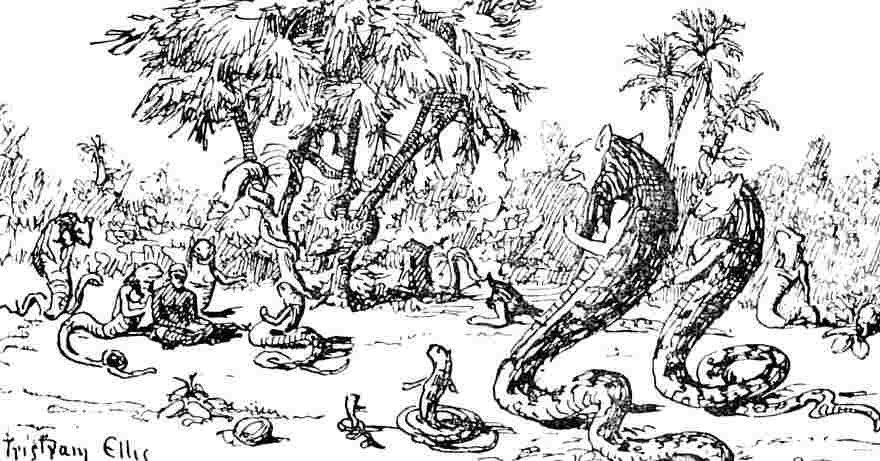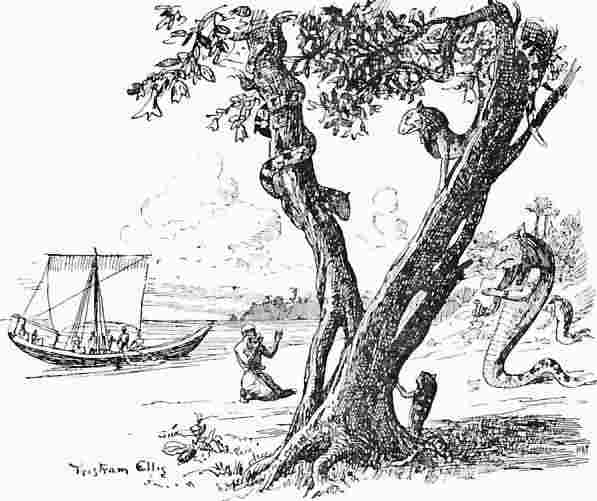
Content created: 990531
File last modified:
| Go to Overview Page. | File Modified: 2012-11-24 |

The wise servant said, "Let thy heart be satisfied, O my lord, for that we have come back to the country; after we have long been on board, and rowed much, the prow has at last touched land. All the people rejoice, and embrace us one after another. Moreover, we have come back in good health, and not a man is lacking; although we have been to the ends of Wawat, and gone through the land of Senmut, we have returned in peace, and our land—behold, we have come back to it. Hear me, my lord; I have no other refuge. Wash thee, and turn the water over thy ringers; then go and tell the tale to the majesty."
His lord replied, "Thy heart continues still its wandering words! but although the mouth of a man may save him, his words may also cover his face with confusion. Wilt thou do then as thy heart moves thee? This that thou wilt say, tell quietly."
The sailor then answered, "Now I shall tell that which has happened to me, to my very self I was going to the mines of Pharaoh, and I went down on the sea on a ship of 150 cubits long and 40 cubits wide, with 150 sailors of the best of Egypt, who had seen heaven and earth, and whose hearts were stronger than lions. They had said that the wind would not be contrary, or that there would be none. But as we approached the land the wind arose, and threw up waves eight cubits high. As for me, I seized a piece of wood; but those who were in the vessel perished, without one remaining. A wave threw me on an island, after that I had been three days alone, without a companion beside my own heart. I laid me in a thicket, and the shadow covered me. Then stretched I my limbs to try to find something for my mouth. I found there figs and grapes, all manner of good herbs, berries and grain, melons of all kinds, fishes and birds. Nothing was lacking. And I satisfied myself; and left on the ground that which was over, of what my arms had been filled withal. I dug a pit, I lighted a fire, and I made a burntoffering unto the gods.
"Suddenly I heard a noise as of thunder, which I thought to be that of a wave of the sea. The trees shook, and the earth was moved. I uncovered my face, and I saw that a serpent drew near. He was thirty cubits long, and his beard greater than two cubits; his body was as overlayed with gold, and his colour as that of true lazuli. He coiled himself before me.
"Then he opened his mouth, while that I lay on my face before him, and he said to me, 'What has brought thee, what has brought thee, little one, what has brought thee? If thou sayest not speedily what has brought thee to this isle, I will make thee know thyself; as a flame thou shalt vanish, if thou tellest me not something I have not heard, or which I knew not, before thee.'
"Then he took me in his mouth and carried me to his resting-place, and layed me down without any hurt. I was whole and sound, and nothing was gone from me. Then he opened his mouth against me, while that I lay on my face before him, and he said, 'What has brought thee, what has brought thee, little one, what has brought thee to this isle which is in the sea, and of which the shores are in the midst of the waves?'

"Then I replied to him, and holding my arms low before him, I said to him,' I was embarked for the mines by the order of the majesty, in a ship, 150 cubits was its length, and the width of it 40 cubits. It had 150 sailors of the best of Egypt, who had seen heaven and earth, and the hearts of whom were stronger than lions. They said that the wind would not be contrary, or that there would be none. Each of them exceeded his companion in the prudence of his heart and the strength of his arm, and I was not beneath any of them. A storm came upon us while we were on the sea. Hardly could we reach to the shore when the wind waxed yet greater, and the waves rose even eight cubits. As for me, I seized a piece of wood, while those who were in the boat perished without one being left with me for three days. Behold me now before thee, for I was brought to this isle by a wave of the sea.'
"Then said he to me, 'Fear not, fear not, little one, and make not thy face sad. If thou hast come to me, it is God who has let thee live. For it is He who has brought thee to this isle of the blest, where nothing is lacking, and which is filled with all good after another, until thou shalt be four months in this isle. Then a ship shall come from thy land with sailors, and thou shalt leave with them and go to thy country, and thou shalt die in thy town.
'"Converse is pleasing, and he who tastes of it passes over his misery. I will therefore tell thee of that which is in this isle. I am here with my brethren and my children around me; we are seventy-five serpents, children, and kindred; without naming a young girl who was brought unto me by chance, and on whom the fire of heaven fell, and burnt her to ashes.

"'As for thee if thou art strong, and if thy heart waits patiently, thou shalt press thy infants to thy bosom and embrace thy wife. Thou shalt return to thy house which is full of all good things, thou shalt see thy land, where thou shalt dwell in the midst of thy kindred.'
"Then I bowed, in my obeisance, and I touched the ground before him. 'Behold now that which I have told thee before. I shall tell of thy presence unto Pharaoh, I shall make him to know of thy greatness, and I will bring to thee of the sacred oils and perfumes, and of incense of the temples with which all gods are honoured. I shall tell, moreover, of that which I do now see (thanks to him), and there shall be rendered to thee praises before the fulness of all the land. I shall slay asses for thee in sacrifice, I shall pluck for thee the birds, and I shall bring for thee ships full of all kinds of the treasures of Egypt, as is comely to do unto a god, a friend of men in a far country, of which men know not.'
"Then he smiled at my speech, because of that which was in his heart, for he said to me, 'Thou art not rich in perfumes, for all that thou hast is but common incense. As for me I am prince of the land of Punt, and I have perfumes. Only the oil which thou sayedst thou wouldest bring is not common in this isle. But, when thou shalt depart from this place, thou shalt never more see this isle; it shall be changed into waves.'
"And, behold, when the ship drew near, according to all that he had told me before, I got me up into an high tree, to strive to see those who were within it. Then I came and told to him this matter; but it was already known unto him before. Then he said to me. 'Farewell, farewell, go to thy house, little one, see again thy children, and let thy name be good in thy town; these are my wishes for thee.'"

"Then I bowed myself before him, and held my arms low before him, and he, he gave me gifts of precious perfumes, of cassia, of sweet woods, of kohl, of cypress, an abundance of incense, of ivory tusks, of baboons, of apes, and all kind of precious things. I embarked all in the ship which was come, and bowing myself, I prayed God for him.
"Then he said to me, 'Behold thou shalt come to thy country in two months, thou shalt press to thy bosom thy children, and thou shalt rest in thy tomb.' After this I went down to the shore unto the ship, and I called to the sailors who were there. Then on the shore I rendered adoration to the master of this isle and to those who dwelt therein.
"When we shall come, in our return, to the house of Pharaoh, in the second month, according to all that the serpent has said, we shall approach unto the palace. And I shall go in before Pharaoh, I shall bring the gifts which I have brought from this isle into the country. Then he shall thank me before the fulness of all the land. Grant then unto me a follower, and lead me to the courtiers of the king. Cast thy eye upon me, after that I am come to land again, after that I have both seen and proved this. Hear my prayer, for it is good to listen to people. It was said unto me, 'Become a wise man, and thou shalt come to honour,' and behold I have become such."
This is finished from its beginning unto its end, even as it was found in a writing. It is written by the scribe of cunning fingers Ameni-amen-aa; may he live in life, wealth, and health!
This tale is only known in one copy, preserved in the Hermitage collection at St. Petersburg. The papyrus has not yet been published, either in facsimile or transcription. But two translations of it have appeared by M. Golenischeff: from the earlier a modified translation is given by Maspero in the "Contes Populaires," 2nd edit., pp. 133-146, and the later translation is in M. Golenischeff's excellent "Inventaire de la collection Egyptienne (Ermitage Imperial)," p. 177-182.
The tale is that of a returned sailor, speaking to his superior and telling his adventures, to induce him to send him on with an introduction to the king. At first his master professes to disbelieve him, and then the sailor protests that this happened to himself, and gives his narrative. The idea of an enchanted island, which has risen from the waves and will sink again, is here found to be one of the oldest plots for a tale of marvels. But the construction is far more advanced than that of the tales of the magicians. The family of serpents and the manner of the great serpent is well conceived, and there are many fine touches of literary quality: such as noise as of thunder, the trees shaking and the earth being moved at the appearance of the great serpent—the speeches of the serpent and his threat—the sailors who had seen heaven and earth—the contempt of the serpent for his offerings,
"As for me, I am prince of the land of Punt, and I have perfumes"—and the scene of departure. All of these points show a firm hand and practised taste, although there is still a style of simplicity clinging to it which agrees well to its date in the XIIth Dynasty.
The great serpent is not of a type usual in Egyptian designs. The human-headed uraeus is seldom bearded; and the best example of such a monster is on an Ethiopian temple, where a great uraeus has human arms and a lion's head. The colours again repeat the favourite combination expressive of splendour—gold and lazuli. Though lazuli is very rare in early times, yet it certainly was known in the XIIth Dynasty, as shown by the forms of some beads of lazuli.
The slaughter of asses in sacrifice is a very peculiar offering, and no sign of this is found in any representations or groups of offerings.
The colophon of the copyist at the end shows by the style of the name that it belongs to the earlier part of the XIIth Dynasty, and if so, the composition might be referred to the opening of foreign trade under Sankhkara or Amenemhat I.